The world grows ever more complex, placing greater and greater demands on human cognitive abilities. How convenient it would be if we could simply increase our intelligence!
This has (of course!) occurred to a number of science fiction writers, as have the potential complications that might ensue.
Camp Concentration by Thomas M. Disch (1968)
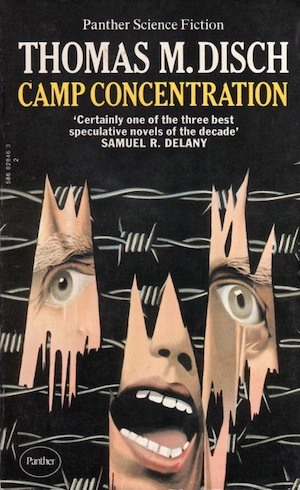
Conscientious objector Louis Sacchetti opposed the endless war, was arrested, tried, convicted, and dispatched to prison without delay or any significant public notice. When top men in President McNamara’s America take note of Louis, the bewildered poet is suddenly transferred to the top-secret Camp Archimedes.
Smarter Americans fight better wars. Or so believes General Humphrey Haast, who thinks he has the means to create smarter Americans. The General’s preferred means of intelligence enhancement is infection with a strain of syphilis that will invariably be lethal within a year.
By the time Louis discovers that enhancement is a death sentence, he has already been injected.
Science fiction is replete with bold visionaries who cast aside conventional science in pursuit of progress. The General belongs to a very special subset: he’s a nut whose pseudoscientific schemes will not produce the results he desires.
“Bounded in a Nutshell” by Charles Sheffield (1978)
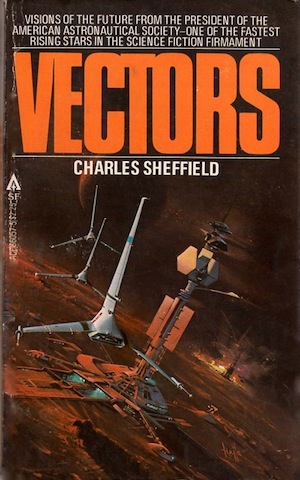
Merle Walters’ WAWD Corporation is confronted by a mystery. Kirkwood Research representatives at widely separated locations have suddenly begun exhibiting coordinated behavior without any obvious means of communication. Kirkwood is running rings around WAWD, and WAWD needs to know how.
While applied psionics is considered, the truth proves simultaneously more mundane and more alarming. Kirkwood has access to unexpected advanced computer technology, tech that provides much the same results as telepathy—along with some even more disturbing capabilities.
Our heroes soon realized that, while it’s convenient to have a computer network a thought away, communication over long distances will be limited by relativity. The network’s immediate gratification will fail if one travels further than a few light seconds from Earth. Humanity, unwilling to abandon connectivity, may find itself trapped on Earth.
Beggars in Spain by Nancy Kress (1993)
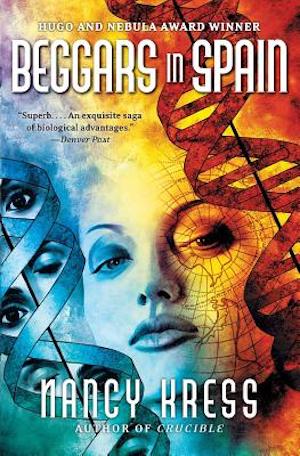
Why settle for haphazard evolution when genetic engineering can guarantee designer babies? One reason might be that one cannot necessarily foresee the consequences of such changes.
Consider what happened when scientists engineered some superior humans, who are extraordinarily bright … but also Sleepless. Normal adults often find it a challenge to deal with baseline babies. Now imagine bright but Sleepless babies who can cry around the clock. Caregivers collapsed, and some babies died.
When the surviving Sleepless reach adulthood, other problems appear. The Sleepless are not just free from any need to sleep, they are brighter and healthier than any unimproved kid. Given twenty-fours every day to learn and do, they are more accomplished. Why should such superlative beings burden themselves supporting their lackluster baseline relatives?
Brain Child by George Turner (1991)
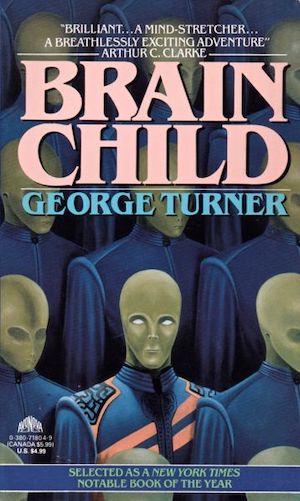
Life in mid-21st century Australia is peachy, except for overpopulation, galloping climate change, and escalating economic calamity. Only geniuses could think their way out of the trap in which Australia finds itself. In 2002, Australia set out to create some geniuses.
Decades later, David Chance is genteelly blackmailed by his heretofore unacknowledged father into investigating the so-called Nursey Children. That grand experiment produced three distinct varieties of genius: one that excelled at science (the group to which David’s father belongs), one at art, and a legitimately post-human group whose achievements could not be usefully assessed by baseline human minds. That last group died by mass suicide for reasons that remain incomprehensible, leaving behind a hidden legacy it falls to David to explore.
This novel appears to share a setting with another Turner novel, The Drowning Towers, AKA The Sea and Summer. If that is so, there is hope. The Drowning Towers makes it clear that human civilization does eventually reach a happier equilibrium with nature…long after it could matter to anyone in this book.
Black Snow Days by Claudia O’Keefe (1990)
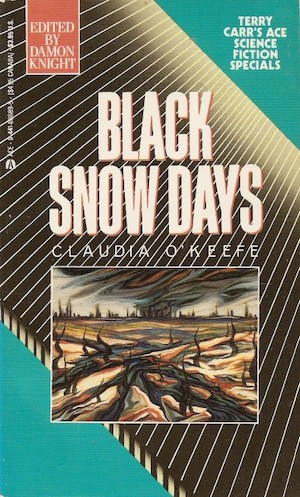
Fearing Eric Pope might take after his unremarkable father, Eric’s mother did what any sensible parent would do in her place: She used science to enhance Eric. Ungrateful Eric proceeded to demonstrate that his terrible judgement was as outsized as his genius—cue one very nearly fatal automobile crash and life-saving suspended animation.
Years later, Eric wakes to discover his body and mind were upgraded while he slept. He cannot rebuke his mother for her temerity. She and billions of others died in 2058’s global thermonuclear war. It doesn’t take long for Eric to discover that while his mother may be dead, he is still her pawn. He is the means by which she will shape the world to her will, long after her death.
The plot suggests that what Eric’s mother really wanted in her son wasn’t raw genius so much as tractability. He does have some free will, but it doesn’t matter in how things play out.
***
There are, of course, a bewildering number of works written on the subject of intelligence augmentation. These five only scratch the surface. If you have favourites I didn’t mention—yes, I see all of the Flowers for Algernon fans waving their hands for attention—comments are below.
In the words of fanfiction author Musty181, four-time Hugo finalist, prolific book reviewer, and perennial Darwin Award nominee James Davis Nicoll “looks like a default mii with glasses.” His work has appeared in Interzone, Publishers Weekly and Romantic Times as well as on his own websites, James Nicoll Reviews (where he is assisted by editor Karen Lofstrom and web person Adrienne L. Travis) and the 2021 and 2022 Aurora Award finalist Young People Read Old SFF (where he is assisted by web person Adrienne L. Travis). His Patreon can be found here.










